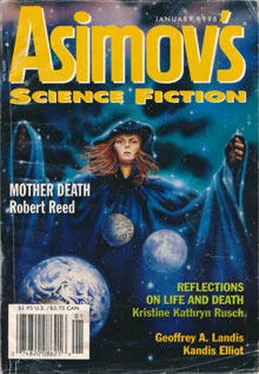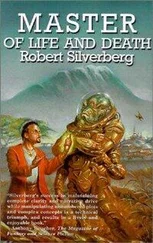“Then take her home,” he whispered. “Take her home.”
1998: Hazlet’s gym. A private club, converted from a row of seventies apartments by a local developer, designed for his tenants, but later opened to paying memberships. Nights and afternoons belonged to the students. Mornings from five A.M. belonged to the seniors.
“Gram,” Sarah said, holding a five-pound weight against her chest. “I don’t need this. I jog.”
“Women need strength,” Gram said. She was wearing gray sweats and had her long gray hair tied back with a red scarf. She was on her back, pressing thirty-five pounds, another elderly woman spotting her as she worked. “Jogging keeps the weight down, but it doesn’t give you strength.” “I had self-defense in school,” Sarah said.
“I’m not talking self-defense,” Gram said. “I’m talking strength. To carry a box, to lift a carton. To be independent.”
Sarah laughed. “I am independent,” she said.
“Now,” Gram said. “Wait fifty years. Independence is something you won’t take for granted then.”
The pizza box was lukewarm by the time Sarah got it to the apartment. The heating chip had burned out a mile away from home, leaving the pizza inside to cool. She pulled the apartment door open, tossed the box on the counter, and threw her coat over a chair.
Janie, her oldest, was studying, squinting at her palmtop. She wasn’t supposed to use such a small screen, but Sarah couldn’t afford anything larger. She knew it meant upgraded lenses for Janie’s bad eyes, but the lenses were in the future. The computer expense was part of the present.
Her son, Keith, whom her daughters had nicknamed Scooter, was taking apart the motorized car she had given him for Christmas. The car had cost half a week’s salary; she hoped he could reassemble it. He was humming along to a radio chip, the telltale cord—required of all in-ear objects—trailing down the side of his head like an errant strand of hair.
Trina, her youngest, was already in the kitchen, standing on a stool as she begged the cereal cabinet to release its lock. She hadn’t figured out the new code yet. It would only be a matter of days. She generally figured out cupboard codes by day five.
“I called,” Sarah said. “I told you I’d be late.”
“House screen’s out,” Scooter said.
“Yeah,” Trina said. “He took out the sound chip for his car.”
Sarah suppressed a sigh. “Scoot,” she said. “We don’t own the house screens. Why didn’t you use your radio chip?”
“ ’Cause I need that,” he said. He stretched out one bare foot, scraping car parts against the hardwood floor.
“Well, see what you can do with the heater on this box,” she said. “I don’t want to pay for microwave time if I can help it.”
“It burn out again?” Janie asked, setting her palmtop aside. “You gotta stop going there.”
“I gotta stop ordering the special,” Sarah said. “They always put it in the oldest boxes.”
Scooter put the car parts beside the baseboard, then got up, brushed himself off, and came into the kitchen. He slid the box off the counter, and stuck a finger in the cardboard. Sarah pulled Trina off her chair and set her on the floor.
“Guys,” she said. “I have a question. Can we make room for your grandmother here?”
“I thought you didn’t like her,” Janie said.
“Yeah,” Scooter said. “Why should we make room for her when she didn’t make room for her mother?”
“Does she know the cupboard codes?” Trina asked.
Sarah bit her lower lip. She hadn’t realized she had put those thoughts in her children’s brains. “I went to that center today. The social worker advised me to bring her home.”
“Why?” Janie set her palmtop on the end table.
“Shut it off, please,” Sarah said, and Janie did. Behind her, cardboard ripped and Scooter cursed. Sarah ignored him.
“Why are you supposed to bring her home?” Janie asked again.
“Because she’d be in a room with seven others,” Sarah said. “Because it’s no place to spend the rest of your life.”
“What do you care?” Scooter asked. “She never did anything for you. ”
Sarah sat down. She was shaking. “She raised me,” Sarah said.
“Yeah, but she didn’t want to,” Trina said. Sarah looked at her daughter. She didn’t remember telling Trina why her mother had left Sarah with Gram at various points in her life.
“You always said she was too busy living her life to care about someone else’s,” Scooter said.
“She’s my mother,” Sarah said, feeling defensive.
“So?” Janie asked. “That doesn’t mean you have to take care of her.”
“I know,” Sarah said, and sighed.
2003: Her mother’s living room. Sarah was standing; her mother was sitting on the white, pink, and blue couch bought at an auction the year before.
“I’ll take care of her, Mom. Instead of paying some home, give me room, board and some pocket change. That way she can stay home.”
Her mother, small and delicate, still wore her hair long. It reached the middle of her back, a gray and black wave as chaotic as her mother could be. The black hairs were straight. The gray was coming in curly.
“Have you ever watched anyone die of cancer?” her mother asked.
“No, but—”
“I have. When I was married to Jack.” Jack. Husband number two. The rich one. The one who died on her, and left all his money to his son, a man two years older than Sarah’s mother. Jack had achieved perfection before he died. The men after that had no hope of catching up. “I did volunteer work at the hospital.”
As if Sarah didn’t know. Her mother was proud of the volunteer work, prouder of that than of her paid work. The volunteer work meant she had time on her hands, time to give away. The paid work—done to support her daughter from her ill-advised rebound of a third marriage—never measured up.
“They used to have fans on in the cancer ward to keep the stink down.” Her mother wrinkled her small nose as if she could still smell the memory.
“Mom, that was in the seventies.”
“It hasn’t gotten any prettier,” her mother said. “And you don’t have the stamina for it. Better that Gram goes where people can take care of her. Better to let her die with dignity, on clean comfortable sheets, in a clean comfortable room.”
“Shouldn’t she have her family with her?”
“She’ll have her family with her,” her mother said, staring past Sarah at something on the street. “We’ll visit her every day.”
“I’m going to take care of her,” Sarah said.
Her mother shook her head. “It’s your choice,” her mother said. “It’s not something I would do.”
“I know,” Sarah said. “You always did what was convenient for you.”
“Not fair, Sarah.”
“But true,” Sarah said.
Sarah clutched the entrance documents in her right hand. As she entered her mother’s hospital room, her fingers tightened, crumpling the pages. Her mother was asleep. The skin stretched across her tiny face, revealing the angles and hollows. Through the translucent surface, Sarah thought she could actually see bone.
—Her strength is failing, the first doctor had said. The pneumonia was just a stage. We can cure the stages, but they will continue. We can stop any disease she gets except the one that’s going to kill her. She’s got old age. No one recovers from that.
—Old age isn’t a disease, Sarah said.
— Oh, but it is, the doctor said. For a reason we don’t understand, the cells fail to regenerate. Or they regenerate improperly. We can stimulate regeneration, but only in certain parts of the body. We can’t touch the brain cells. And no matter what we do, some parts always fail. The heart muscle atrophies. It’s as if total degeneration is built into the system. Your mother’s degeneration has started. We can do nothing to end it except—end it.
Читать дальше












